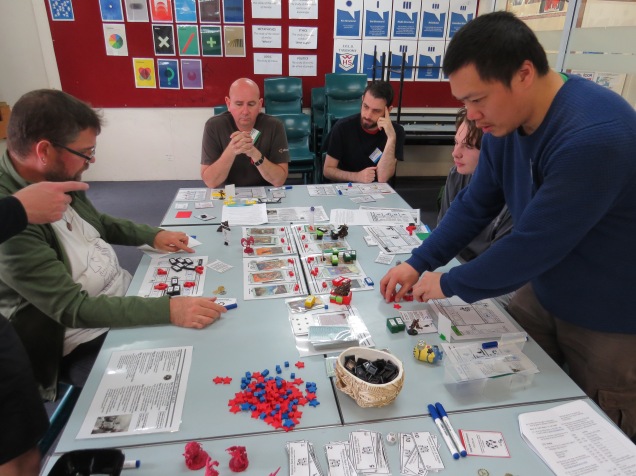 The Colossus of Atlantis Megagame was a success. We had a few last minute registrations that allowed us to run four map tables, with four five player teams and a wandering hero or two in each round. Close to 30 people involved over the entire game. The feedback on the day felt positive, and secondary feedback from other people on Sunday lined up with everyone having a good time and raving about it to their friends.
The Colossus of Atlantis Megagame was a success. We had a few last minute registrations that allowed us to run four map tables, with four five player teams and a wandering hero or two in each round. Close to 30 people involved over the entire game. The feedback on the day felt positive, and secondary feedback from other people on Sunday lined up with everyone having a good time and raving about it to their friends.
With the late registrations we started a little late, and halfway through we changed the 30 minute turns to 40 minute turns. We still got through eight of the planned ten turns and were packed up before the LARP needed the space.
The overall outcome was that Atlantis did not sink, and the Atlantean Generals combined their forces and defeated all four of the enemy empires of Leng, Mu, Argartha and Lemuria. The most fun plot element that I observed was the squabbling and plots over who would get one of the five seats on the Ark if Atlantis did sink.
The map game worked well. There is some room for refinement, but I will award myself a B+ for that part of the game. The council game worked okay, but has definite room for significant improvement, so I will only give myself a C+ there. While I had good rules and help sheets for the map game, its clear the Council games needs more support structure to enable the players to make interesting choices, and for Control to be able to stay on top of what is happening. I also need to make the admin more efficient for Control – they had almost no time for breaks.
Now that I have written the above, I will look at the actual feedback sheets the players filled out. I adapted the Megagame Makers feedback sheet, which can be found here.
Enjoyment – did you have fun?
An average of 4.7 (to one decimal place) on a 1-5 scale where 5 is good and 1 is poor. This is an excellent result, and no one rated the game below a 3.
Briefing – how well did the briefing enable you to play the game?
An average of 3.3. Not a great result, so I went and dug a little deeper into the numbers. Seven people did not read the rules before the game – not an unexpected proportion as we had 4-5 people join at the last minute. The average of the six people who did not read the rules for this question and have it a rating was 2.8. The average among the 15 players who did read the rules was 3.5.
Difficulty – how hard did you find the game to play (1 = easy)?
An average of 3, right in the Goldilocks spot. Two people rated the game at 1 (too easy), but no one rated it a 5 (too hard).
Rate of Play – how much pressure (1 = too much 5 = too little)?
Once again a 3, right in the Goldilocks spot. Most people rated it a 3, with five each for 2 and 4, and no one rating it at 1 or 5. we did increase the time for each turn by ten minutes after the lunch break, and there was a bit more pressure on Control than players.
Control – how good a job did they do?
An average of 4.6 is an excellent result. No ratings below 3.
Involvement – how was your involvement with other players?
An average of 4.1. I did not see or hear of any major problems between players and/or control. No one rated this below a 3.
Value – did you get value for money?
4.7. Almost everyone (20 of 23 responses) rated this a 5. At NZ$20 for the weekend convention and no extra fee for the Megagame, its about one-third to one-quarter of the international benchmarks for pricing.
Did you read the rules before playing the game?
15 said YES and six said NO.
Would you be interested in playing Megagames in the future?
22 players said yes and one said no. Looking deeper at the no response, they gave Colossus a 3 for fun and a 5 for value for money. Their specific comment on the game was “Explain how invasions work.” As they were a Philosophos, I was relying on their team Strategos to tell them how invasions worked, as that information was in the Strategos briefing.
Would you be interested in being CONTROL in a future Megagame?
15 people said yes. Which is awesome. Always need more Control players.
How much would you be willing to pay for a Megagame?
I broke this down into two subcategories: day-long and evening length games. For day-long games the range was $15-70, with an average of $32.22. For evening length games the range was $10-50, with an average of $23.83. This is about half the going rate for Megagames in Canada, USA and UK.
This question is of interest to me as hiring a basic conference venue in Wellington starts at around $450 a day. If I have 35 players willing to pay $30 then my budget for running a future Megagame is a little over $1,000. But if I lose about half my players if I charge more than $20 (I had some feedback that the standard LARP charge in NZ is $20), then my budget is only $700. That is enough for one large room in a basic conference venue – which could see a bit of noise pollution in the game. $250 will pay for some printing and game components, but its not going to let you buy premium components or even full colour maps (the last time I got A3 colour printing done a complex map covering a standard gaming table was costing me $150 due to the set up fees for multiple images).
For the immediate future, the safe bet is to attach the game to other conventions, and pass the hat around for donations at the end of the game. I would like to see the community of interested players grow to the point where I can hire my own venue and choose my own dates for running the game. The main disadvantage with Kapcon is that it clashes with Canterbury Faire, the biggest SCA event in New Zealand, and I probably had at least five potential players away at that week long event.
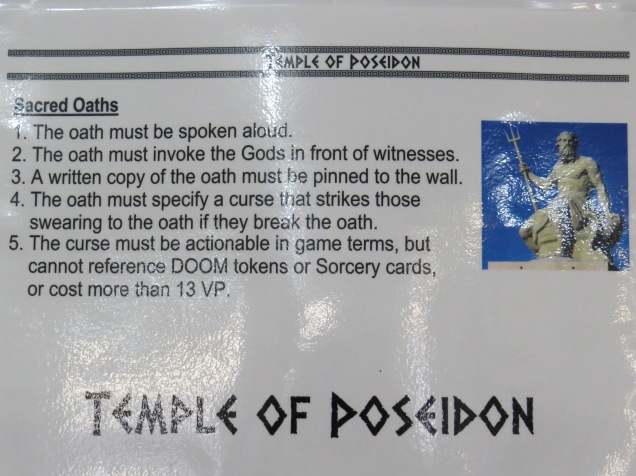
I also asked people to give me feedback on one thing to keep in future games, one thing to stop, and one thing to start doing to make the game better. Original feedback in plain text, my follow up in italics.
Keep
More team time for general strategy.
Combat upgrades works well.Council interactions were fun.
Almost all of it.
Timing. Role changing, within reason. Changing roles could break the power balance in councils if a team could have multiple positions in the same game role, and the design intention is that each role is essential to a team, and each role is engaging and fun to play (even if it was not your first choice).
Diplomatic wrangling. More reason to do it. Skulduggery – wandering heroes as empire emissaries (or) incentive cards for treachery. I do intend to add more options for players to choose between altruism and corruption.
Complexity level about right.
Confusion from lack of team communication about NPC enemies, multiple rooms and time pressure.
35 people. At 35 players all the game components fit in one suitcase. The game is designed to be scalable, but once you have more than seven players on a Council they will require more time, or the creation of more Councils.
Simultaneous actions.
Alien armada. I think they meant “enemy empire”.
Having a team to assist victory. Keep being strict on times but maybe expand the length of the rounds a little. Council had some great emergent stuff. Control resetting map was excellent. Yes, Control were tasked with helping players by rubbing all the marks off the players laminated sheets each turn.
Alliances short of joining a house for heroes.
Oversight in each room. Being nice. No swearing.
Empires and monsters. I do wonder if having an ambassador for each of the enemy empires would have been an interesting addition to the game.
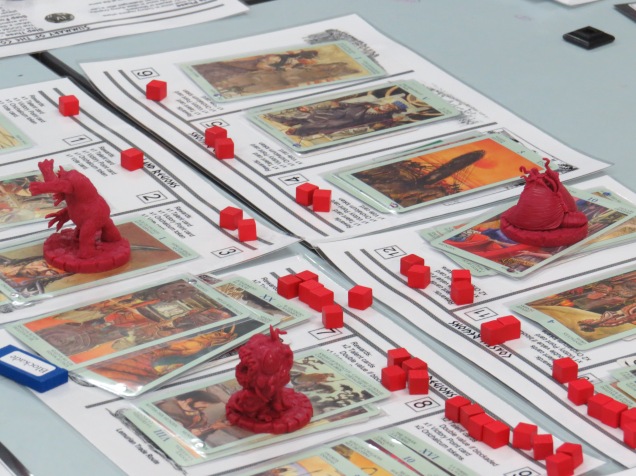
Stop
Make sure Control on same page.
So many rule changes. One role per region, i.e. not 2 Strategos in one region. Because we had four map tables, not five, each team had a table with two players on it. I left it with the teams, however, as to where they allocated their leaders, and they could change players between map tables if they wanted to (I am not sure any did so).
Additional rules. modify instead of add.
Maybe limit the number of new rules added in a turn.
Need for clearer rules around council meetings.
Team (a) scoring at the end of the game was horrible! By tables? (b) Wonder scoring is BROKEN. VP for BUILDER + VP Contributors (people who supported construction). Some kind of worksheet. Yes, I needed better worksheets for the end of game scoring (the turn by turn sheets for each map table seemed to have worked okay). Wonder scoring was deliberately broken (a feature, not a bug), but at least one team had an Arkitekton who failed to realise they needed to spend money on Wonder construction, so they lost out on the VP race.
Game was too soft/too easy to win? Maybe, maybe not. Maybe we just played well. Yes, you played well.
Rampant player collusion. Although … 5 x str 89 smash 18 monsters … [comment from a Control player].
Time pressure.
Rule change.
Rule changing.
Overspending on wonders.
Dividing the last minute players onto one team was a bit tricky ~one experienced player would have helped. Its hard to find an experienced player when its the first public run of the game – and the one player who had been given a run through the game was promoted to Control when the extras turned up. The problem with rejigging the teams was that many players had already been plotting for a couple of days, and I was loathe to break up their team.
Missing some info that could be on cards i.e. voting cards not clear (I think) that turn values add to VOTE total (and if 1 person [knows?] can get out of hand).
Wonder building as dominant VP. Wonders were intended as a money sink, but I will admit to being surprised at just how altruistic all the players were about giving nearly all their cash to their Arkitekton.
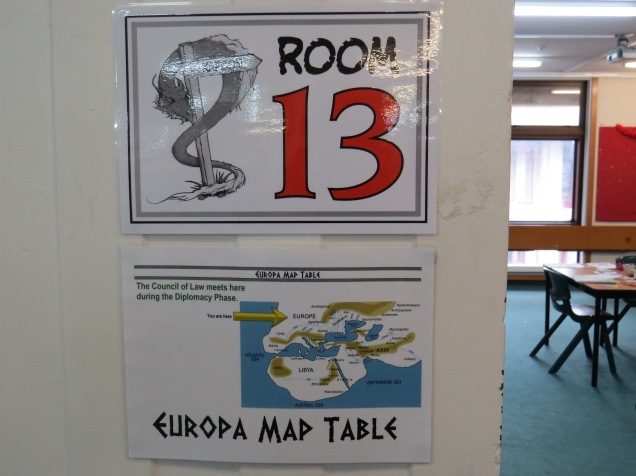 Start
Start
General meetings between rounds for announcements. I had originally wanted to do this, but on the day I was just too busy. With another Control person to help with admin this would be possible.
Show magikos Orichalcum is sum of compared to the number allocated to Hop/Tri/Col. This calculation was too complex/not clear enough on the reference sheet. I will be changing it.
More time to plan unit deployment. I’m not convinced more time is needed for this.
Maybe add extra time to say what rules are changed each round. If a create a lot of the optional changes before the game starts, then I can have prewritten material to be distributed to update people on changes. Another option is to restrict each Council to one rule change per turn.
Permanent Control over card trading. One way of doing this will be to place the cards by the table where the Council meeting for the players allowed to purchase those cards is.
Come to Canberrra! I’m happy to travel and run the game as long as my travel, accommodation and incidental costs are met. I will also work on a licensed version of the game that anyone can download and run for a small fee.
More motivation for skulduggery, [therefore] rules need to be in there. I think the best place for more skulduggery is in the Council meetings, as the map game is already very busy. It is a goal of my design that Colossus includes some “prisoner’s dilemma” choices and personal goals that can undermine team goals.
More visible timers. Yes, one of the Control team working on an app for more synchronised timekeeping.
A briefing sheet for wandering heroes similar to other roles, but focused on hero. My bad, these did exist, but I failed to put one in your hands when you turned up halfway through the game.
Maps.
Keep better control of time. And also involve less luck in the win. Time pressure is something Control can always be improving. I don’t think the final win relied much on luck. The wining team had scored well consistently throughout the game.
Refining the voting rules. I think if each Council is given its own rule book with a clear process and flowchart of actions, then a lot of the problems with voting will go away. The player vote cards can definitely be improved with better instructions on the one use vote cards and a clearer display of how many votes each player has.
Online video with rules. I would like to do this, but I would need to get/borrow a decent video camera first.
A DOOM track. Yes, good idea. Need a visual reference for all players/control of what current Atlantis DOOM is. This would also be something that could be tweeted.
More focus on how the council works/voting works – having a GM be able to say do A B C.
Trying to dominate one council completely. I’m pretty sure players were trying to do this, with reasonable success in the game. Allowing a player to permanently dominate a council, makes that part of the game play broken for everyone else.
What next?
I will think about the feedback for a bit longer, and then pen a second post on some possible changes to the rules later this week. I am still committed to running this game at GENCON this year. In the mean time I am keen to hear further comments and suggestions from the players and Control who helped make it all work on the day!
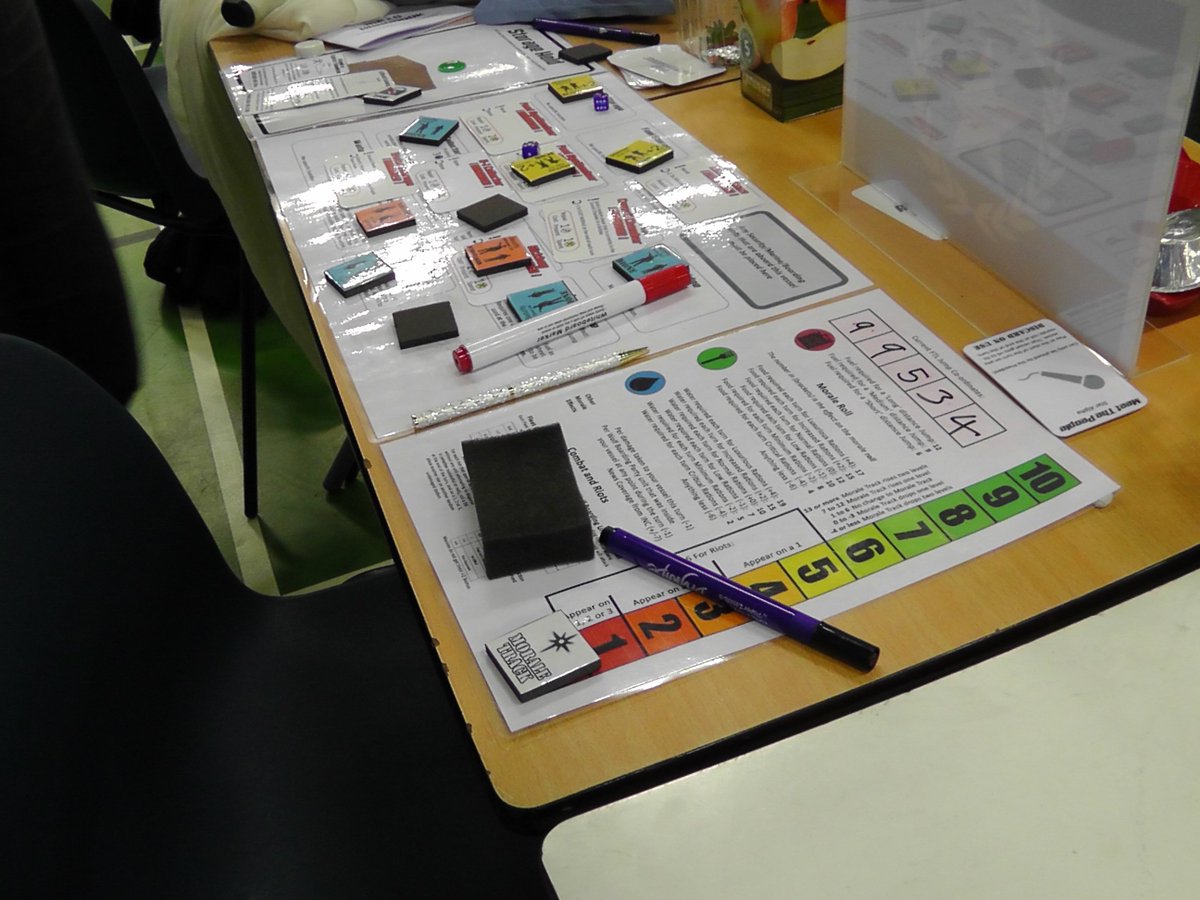


 Watch the Skies: Dragons
Watch the Skies: Dragons Colossus of Atlantis III
Colossus of Atlantis III The Reaching Moon
The Reaching Moon Mars 1938 (or The Queen of Mars)
Mars 1938 (or The Queen of Mars)







 The Colossus of Atlantis Megagame was a success. We had a few last minute registrations that allowed us to run four map tables, with four five player teams and a wandering hero or two in each round. Close to 30 people involved over the entire game. The feedback on the day felt positive, and secondary feedback from other people on Sunday lined up with everyone having a good time and raving about it to their friends.
The Colossus of Atlantis Megagame was a success. We had a few last minute registrations that allowed us to run four map tables, with four five player teams and a wandering hero or two in each round. Close to 30 people involved over the entire game. The feedback on the day felt positive, and secondary feedback from other people on Sunday lined up with everyone having a good time and raving about it to their friends.

 Start
Start